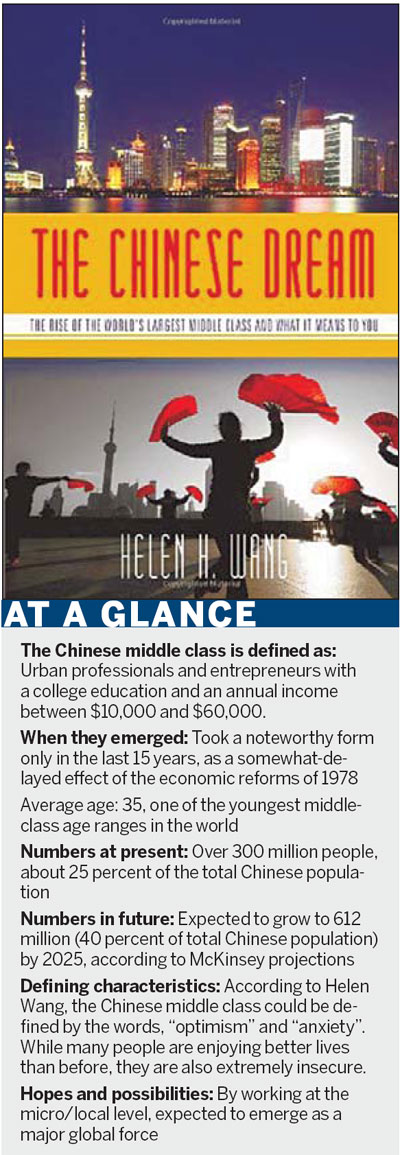Books
Defining a new dream
Updated: 2011-06-24 07:52
By Chitralekha Basu (China Daily)

Author Helen H. Wang says the country's growing middle class holds the key to deepening trust between the West and China and realizing the value of 'our global oneness'. Chitralekha Basu reports.
Helen H. Wang left her hometown of Hangzhou, Zhejiang province, in 1989, with the proverbial Great American Dream twinkling in her eyes. Like many other driven young people of her generation, she emigrated and made a life for herself. She enrolled as a graduate student at Stanford University, later became a consultant for Fortune 500 companies and, subsequently, an entrepreneur in Silicon Valley start-ups. She changed her name from Haiyan to Helen, married an American, acquired United States citizenship and now lives in a cosy home in Silicon Valley with her pet dog Frodo and parakeet Star, enjoying the occasional session of yoga and dancing.
It's an all-too-familiar story.
The turning point came in 2004, when Wang returned to China as a Reuters fellow, to help women entrepreneurs in remote and underprivileged communities access online markets through mobile phones.
Even as she traveled across the small towns of China, trying to develop the e-Mobilizer project, as she called it, Wang was moved by the pace and scale of development in the country she had left 15 years ago.
"At the same time, I found an increasing fear of China's spectacular growth in the West," she says.
Concerned by the gap in understanding between China and the West, which seems to widen with China's exponential industrial, economic and political growth, Wang felt obliged to tell the story, as it is.
The Chinese Dream: The Rise of the World's Largest Middle Class and What it Means to You is Wang's attempt to "bridge the gap" and clear the air of misunderstanding and mistrust between China and the West (primarily the United States).
Be it climate change or global trade, Wang argues in her book, what China or the US does affects the other. Therefore, "our ability to live peacefully and harmoniously as global neighbors depends on our recognition of our interdependence".
Her contention is that it's the Chinese middle class that will lead China toward understanding and realizing the value of "our global oneness".
The more than 300-million-strong community of urban professionals and entrepreneurs with college educations and an annual income of between $10,000 and $60,000, came into existence only about 15 years back, but is projected to cross the 612 million mark by 2025.
They are an emerging global force who, with time, will see that the middle class urban Western man is not that much different from his counterpart in China, that "they are connected by a common set of core values", Wang says.
And common interests as well. For example, as consumer culture catches on in China, its humongous consumer market, Wang contends, could be "an alternative growth engine for the global economy", in fact, "an answer to America's economic woes".
On the other hand, a full-on consumer boom in China will result in serious challenges to preserving the ecological balance.
In 2008, China replaced the US as the biggest emitter of greenhouse gases. This is where the US, with its experience in tackling environmental pollution, use of new technology and non-governmental initiatives, can come in.
"If the two countries work together in developing new clean energy technologies, such as solar power and electric vehicles, they can develop them on a large scale and achieve a major leap in clean energy that neither could make alone," she writes.
And this cooperation could start at the micro level, with everyone remembering to sort out the trash and putting it in separate bins for recycling.
A culture of fraternizing among nations is already beginning to emerge, Wang says.
"China is picking up ideas and learning like crazy from the West, while Eastern culture and philosophy is so hot in the United States. The differences between these two cultures are there, but people, especially those from the academic and business communities, are more aware of these than before.
"My book is a small contribution to this convergence of interests and tendencies from both cultures," Wang adds.
The Chinese Dream has an obvious resonance with the idea of The Great American Dream. American historian James Truslow Adams defined the concept as "life should be better and richer and fuller for everyone, with opportunity for each according to ability or achievement regardless of social class or circumstances of birth".
It also brings to mind Martin Luther King Jr.'s now-mythical public address at a civil rights march in Washington DC in 1963, making an impassioned case for racial equality. The latter, along with Abraham Lincoln's Gettysburg Address, inspired Wang to leave Chinese shores and seek a life in the US in the late 1980s.
"They seemed to breathe fresh air in my life and my thinking," she recalls. "I was young, I wanted to experience something radically different."
Years later, while interviewing some 100-odd people for her book, Wang found most of them were far too rooted in reality to indulge in the luxury of dreaming. They told her as much, in unequivocal terms.
Barring a few exceptions.
Yi Fan started as an unskilled migrant laborer in a plastic factory. By sheer grit, hard work and perseverance he rose through the ranks to become the general manager of a flourishing restaurant, earning a decent salary. But it was taking up the distributorship of a mobile phone brand that changed his life. In less than two years he had made 3 million yuan ($463,800). He was only 25.
Seven years later, Wang met Yi Fan again. He was the owner and chief instructor of an English-language teaching institute, dedicated to the cause of ensuring better lives and opportunities for non-English-enabled people as he himself once was.
"I found him inspiring," Wang says. "I think he stands out for his energy, optimism and ultimately the choice he made. That gave me hope, the fact that people valued selfless service in this cynical, materialistic world."
"Unlike in the US there is no core Chinese dream," Wang admits. But she is hopeful that as the Chinese middle class evolves, they too will "acquire a vision and start dreaming about it".
"I think it's important to encourage the Chinese to dream, no matter how impossible it seems to achieve." She believes the Chinese dream, at the end of the day, would have similarities with its American counterpart.
It's going to be about making a good life in a world in which "different nations interact harmoniously as if they were part of one body".


Specials

Premier Wen's European Visit
Premier Wen visits Hungary, Britain and Germany June 24-28.

My China story
Foreign readers are invited to share your China stories.

Singing up a revolution
Welshman makes a good living with songs that recall the fervor of China's New Beginning.